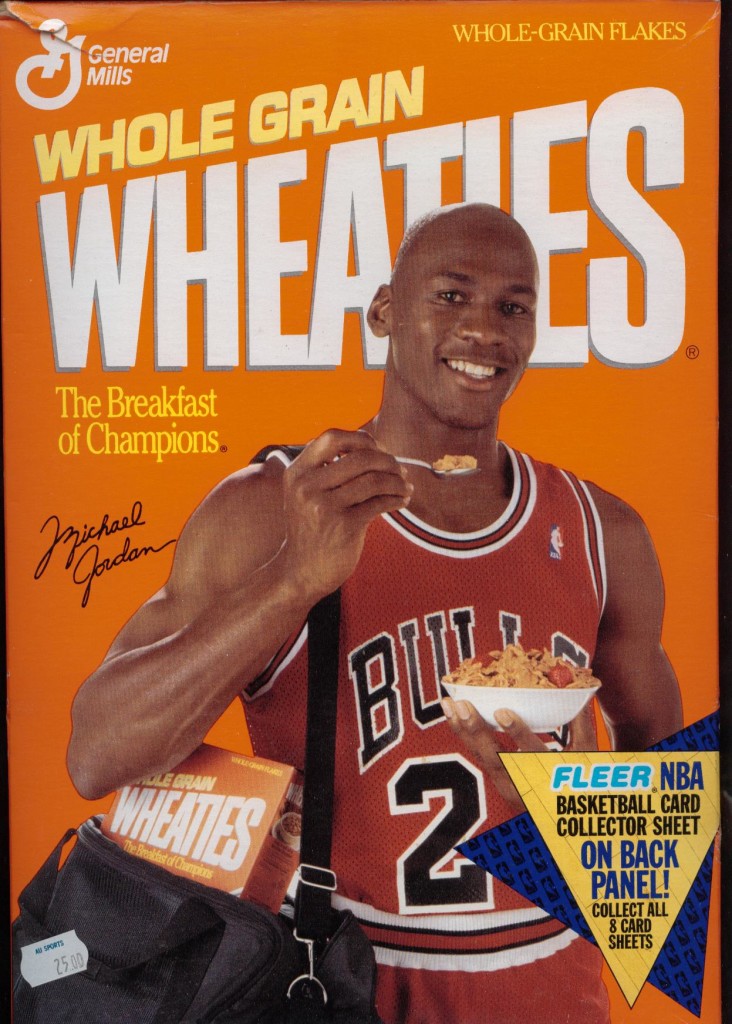I used to love starting my morning off with a big bowl of cereal and fat-free milk. I never missed breakfast.
The problem was, I would be hungry in an hour, I would experience energy dips throughout the day (especially on my drive to work), and I couldn’t burn the excess fat around my belly. But it couldn’t have been the cereal. I ate Wheaties after all…the very same cereal that drove Michael Jordan to become one of the best basketball players of all time.

When I decided to try the Paleo diet four years ago, I knew the hardest part would be getting rid of my morning cereal and milk.
But when I replaced cereal and milk with a spinach omelet and some berries, I had more energy than I’ve ever had, I felt satisfied for hours, and I got a six-pack.
Weird!??
As I transitioned to a lower-carb/higher-fat Paleo-style diet, my desire for carbs in the morning also diminished.
The birth of high carbohydrate breakfasts
It turns out that the idea of a high carb breakfast that is promoted by many health and fitness expert isn’t actually based on any science. Carbs for breakfast was introduced to the U.S. by a man named Dr. John Kellogg (name sound familiar?)
Before the introduction of cereal for breakfast, many wealthy Americans ate a breakfast of meat and eggs.
General Kellogg, a devout Seventh-day Adventist and one of the most prominent figures in the early development of the Seventh-day Adventist Church, was influential in the development of many of the Church’s distinctive health and dietary teachings and practices.
Advantest’s don’t believe in eating animal products, so one of Dr. Kellogg’s ideas to keep them away from eating animal products for breakfast was the invention of corn flakes. Corn flakes spawned the breakfast cereal industry and revolutionized how people eat in the mornings. He also happened to be very influential to the U.S. government which is how eating cereal and carbohydrates worked its way into the mainstream.
The morning is prime time to determine how your body burns and stores fat.
We have an opportunity to influence the chemical reactions that occur in our bodies first thing in the morning. The hormones and neurotransmitters released have a huge role in how our bodies utilize and convert carbohydrates to fat.
The Science (skip if you’re not interested in the details)
Researchers at the University of Missouri recently reported that eating a high-protein breakfast is particularly effective at reducing food cravings and boosting dopamine, a brain chemical usually associated with feelings of reward.
Insulin is one of the hormones that are triggered in the morning, especially by carbs. Its job is to shuttle carbs to the liver to be stored as quick fuel. Once the liver’s “tank” is full (it doesn’t have much room), the liver sends the rest of the carbs to be stored as fat. So if you don’t eat carbohydrates first thing in the morning, you don’t stimulate insulin and the body’s fat stores aren’t flooded.
Another hormone that controls our morning is cortisol, “the stress hormone”. We typically have a high surge of cortisol first thing in the morning (this is what wakes us up). One of cortisol’s main purposes is to break down complex molecules in the body. If insulin isn’t around (because it wasn’t triggered by carbs), the complex molecule it breaks down is fat, allowing you to tap into that energy reserve and burn more body fat.
Once you introduce carbs (and in affect insulin), cortisol stays up causing you to store more fat along with other bad effects.
My New Breakfast Routine – No More Wheaties
I don’t even eat breakfast much anymore. I either have coffee with full-fat coconut milk, MCT oil and cinnamon (no sugar or carbs) which holds me over until lunch or I’ll eat something when I start to feel hungry, usually around 10.
I also don’t eat before I workout which allows my body to tap into its fat stores for fuel.
Try a High Protein or High Fat Morning
The simple habit of eating protein and some fat in the morning can completely change the way you look and feel.
Start your first meal off with 30 grams or more of protein and some healthy fat but little to no carbs. This will trigger your satiety signal and keep you full longer and it will also trigger a hormone reaction to burn fat rather than store it.
Consider protein your battery’s jump-starter. Protein not only boosts your metabolism, it keeps you full longer, and decreases carb impulses. Protein also contains amino acids that build lean muscle, and muscle burns fat.
So eat some eggs with yolks, drink up a protein shake, or both in the morning. Each ounce of animal meat/chicken/fish/eggs is roughly 7 grams of protein, so work something out to get at least 30g of protein in.
If you’re short on time, make a protein packed green smoothie or even faster, an evolved coffee.
You may also want to start your day with an Intermittent Fast coffee—Fresh coffee blended with a teaspoon of MCT oil and a tablespoon of grass-fed butter, ghee or some full-fat coconut milk.
These healthy fats will be burned directly as energy and keep you feeling fuller longer—you shouldn’t have to eat a meal for about four to six hours.
This is a great way to get your body fat-adapted, burning fat as fuel rather than sugar and carbs.
Try changing up your morning breakfast routine for a week or two and see if you notice a difference in how you look and feel.
What do you typically eat for breakfast?
Leave a Reply